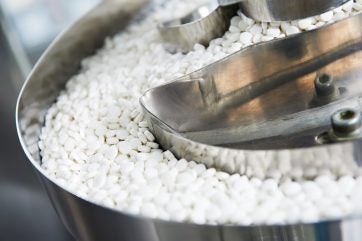
According to a recent poll of Pharmaceutical Technology readers (conducted by GlobalData)[i] 43% of respondents said that environmental issues were the most important ESG (Environmental, Social, and Governance) area that pharma needs to address. However, the pharma industry’s contribution to environmental issues is multifaceted, with links to almost every step in the process, including R&D, supply chain, transport logistics, disposal of pharmaceutical products, and chemistry.
The granulation process, for example, is essential to medicinal dosage forms but failure to approach this step with the right technique can make granulation energy intensive. So how can manufacturers ensure that they are using the most efficient methods of granulation available while reducing their carbon footprint?
Dry granulation is 10x more efficient than wet granulation
Perhaps the most significant way to reduce your carbon footprint is to reduce your energy usage. Not only will this reduce CO2 emissions, but it will also reduce costs.
This is possible in two ways: ensuring that you are using the most efficient equipment; and choosing the most efficient system of granulation for your drug products.
According to Michael Schupp, Head of Process Engineering at specialists in dry granulation systems for the pharmaceutical industry, Gerteis, of the two main granulation processes, dry and wet, dry granulation is by far the most efficient method.
“It’s so much more energy efficient. In fact, dry granulation is ten times more efficient in terms of energy usage,” he says.
Schupp says that dry granulation has an energy consumption of 0.03 kW/kg. This compares to wet granulation which at 0.3 kW/kg, is a factor of ten higher, mainly due to requiring additional liquids and heat for drying.
New research published in January[ii], shows that for wet granulation the actual granulating equipment only accounts for around 13% and 15% of total energy consumed by the entire production pathway. Comparatively, the drying stage accounts for around 45% and 84% of twin screw and high shear granulation production pathways.
There is also a smaller footprint for the dry granulation equipment, notes Schupp, because no additional drying equipment is required.
“You need less floor space and air conditioning for the production area,” he says. “The whole production area can be smaller and more efficient.”
Another advantage is that rolling compaction (dry granulation) is continuous by design, meaning it is easily scalable, and results in less wastage of product due to its fast set-up.
“Firstly, you don’t have to clean the machine between small batches, and the production quantity is not limited,” says Schupp. “You can just run the machine for a longer duration to increase your production. Secondly, we don’t have any residuals left inside our machine. Almost all product that goes in, comes out. Nothing is wasted.”
Making production more sustainable
Gerteis is working to increase energy efficiency by implementing sustainable practices and developing new and improved processes for pharmaceutical granulation. Efforts to make its own production methods more sustainable include focusing on local suppliers and using renewable energy at its production plant, based on the shores of Lake Zurich, in Switzerland.
The plant is built to strict Swiss Minergie building standards and includes a geothermal heating system, solar panels and tripleglazing insulation. Gerteis also ensures local recycling of paper, plastics, and metals, with an additional project to reduce paper by going paperless, offering customers documents in electronic format.
“We are also supporting remote service and installations,” Schupp says. “That’s a huge gain for us because we have many international customers, and we are able to provide remote services and installations.”
The company also encourages its employees to use public transport and supports this with a special travel card allowing for 50% discount on tickets. Usage for private trips is strongly encouraged.
Finally, the firm works with a local farm and restaurant that harvests, cooks, and markets its own seasonal products, meaning employees can enjoy locally sourced meals, and avoid ‘food miles.’
High-quality lasts
The Swiss are rightly famous for their quality, and Schupp tells us that Gerteis has a policy of maintaining that legacy.
“Production in Switzerland is regulated, for ourselves and our suppliers as well,” Schupp says. “Swiss suppliers are always high quality and if you have a high-quality product it will have longer durability. We’re not part of the throwaway society.”
For more information on how Gerteis can help with your granulation process, visit www.gerteis.com
[i] GlobalData poll was completed by 434 readers of Pharmaceutical Technology website between January 12–February 16.
[ii] https://www.sciencedirect.com/science/article/pii/S0263876223008286


